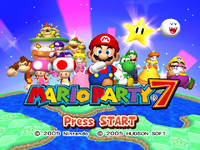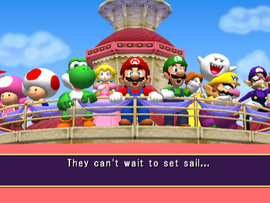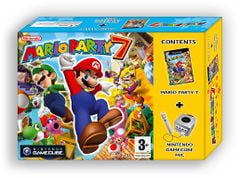Mario Party 7
Template:Infobox Mario Party 7 is the seventh home console installment in the Mario Party series, and the fourth and final installment for the Nintendo GameCube system. It is the final series for the Nintendo GameCube before Mario Party 8 launch exclusively for Wii. In this game, Mario and the gang go vacationing on Mushroom World (to locales based off of the real world) using Peach's Cruiser, MSS Sea Star. However, Bowser is not invited on the cruise and decides to cause trouble for Mario and his friends.
The game has a unique feature to allow up to eight players to join the party, with two players each sharing a controller.
Story
From the Mario Party 7 Instruction booklet:
TOADSWORTH: Oh, I say! Hello there! It's me, Toadsworth! Yes, yes, let me tell you about what happened recently. You see, Mario and his friends are always busy fighting evil and saving the world and so forth, so I offered him a chance to come on a cruise around the world! Oh ho! Splendid! But in doing so, I apparently made that rogue Bowser somewhat angry. Let me tell you what he said...
BOWSER: "This makes me MAAAAD!! GRRRAAAA!! They're going on a vacation... AND NOT TAKING ME! They want a fun vacation? I'll give them a fun vacation! And by that, I mean NO FUN AT ALL! I'll find those chumps and wreck their good times! Bwa ha ha ha!"
TOADSWORTH: Great Kippers! That King Koopa has never been that angry! Who knows what he'll do? But chin up, old bean! We won't let him ruin our good times, right? Right!
Toadsworth has invited Mario and all his friends to go on a luxury cruise around the world. However, Toadsworth invited everyone except for one person, Bowser. Furious at being omitted, the Koopa King vows revenge. When the cruise ship arrives at its first destination, the passengers discover that Bowser has turned their vacation paradise into a stress-filled madhouse.
The goal is to gather stars, but each board requires one to do that in a different way. For instance, people must buy a star at Pagoda Peak, if they have enough coins. In Neon Heights, one must pay coins to open a treasure box. One might find a star — or something far less desirable. Also, in Bowser's Enchanted Inferno, players may be on their way to getting a star, but end up not getting it and losing half of their coins. In Solo Cruise, some boards do not involve purchasing stars, but stealing them.
Gameplay
Basic Rules
Mario Party 7 features game boards on which players and CPU characters move around on spaces similar to a board game. Players roll Dice Blocks with numbers from 1 to 10 to advance on the board. At the beginning of the game, the turn order is determined by a Dice Block roll. Each player starts off with ten coins, and the number of coins is affected by the spaces that the player lands on after their turn. For example, landing on a Blue Space will give a player three coins, while landing on a Red Space will take three coins away. The boards feature a variety of spaces that have different effects, and players can collect items known as Orbs or buy them at shops. The items can be used to have different effects.
The main objective of any Mario Party game is to gain Stars that are located at a special location in the level. In Mario Party 7, each board offers its unique way to obtain stars. For example, on Grand Canal, the Star will appear on a random location on the board, and the first player to get to the Star can buy it with 20 coins. Then, the location of the Star is randomized again. In Pagoda Peak, the star is always at the peak of the mountain, and its price varies from 10 to 40 coins. After a Star is bought, the price increases until it hits 40, and after that it resets to ten.
After each player has completed his or her turn, a mini-game is played. The type of the mini-game is determined by the colors of the spaces that the players ended their turn on. When all colors match, a four-player free-for-all mini-game is played, otherwise there is a 1vs3 or a 2vs2 mini-game. In Mario Party 7, mini-games might involve clearing action courses, solving puzzles faster than the other players, or fighting against each other. Several mini-games use the Nintendo GameCube Microphone that is shipped with the game and plugs into Memory Card Slot B.
A new addition to the game is Bowser Time. After each turn, a special gauge will appear on the screen to tell the player when that time comes. When the gauge is all filled up, then it's Bowser Time. During this special event, Bowser will come to the board and cause trouble in various ways. This special event happens every five turns.
At the end of every game, Toadsworth announces the game's current Star count and final coin count. After that, there will be Bonus Stars for the players who did the best during the match and then, the final tally is announced and the person with the most Stars overall, wins the match.
Options
Each party in the Party Cruise mode or Special Cruise mode can be played with different options.
- Rounds: The number of rounds that the game takes to be finished can be set between 10 and 50 rounds in 5 round intervals.
- Mini-games: By default, all available mini-games are played. Players can restrict the mini-games to only being Family games, Action games, Technical games, or Bizarre games.
- Bonus Stars: Optionally, there are three Bonus Stars awarded at the end of the game. The three Bonus Stars are randomly awarded for three of the following achievements:
- Mini-Game Star: Most coins earned in mini-games.
- Action Star: Most Green Spaces landed on.
- Orb Star: Most Orbs used.
- Shopping Star: Most coins used to buy Orbs.
- Red Star: Most Red Spaces landed on.
- Running Star: Most spaces walked over in total.
- Team Settings: The game offers 4 player free-for-all, 2vs2 team play and 2vs2vs2vs2 team play (in 8 player mode). When playing as a team, players in a team share their turns and each roll a half die (it has numbers from 1 to 5), and they share all items, coins, and stars.
Playable Characters

Returning Playable Characters:
New Playable Characters (Both can be unlocked by purchasing them with 1,000 Mileage Points each at the Duty-Free Shop):
Boards
- Grand Canal – Venice (Italy)
- Pagoda Peak – China
- Pyramid Park – Egypt
- Neon Heights – New York (United States)
- Windmillville – The Netherlands
- Bowser's Enchanted Inferno! (unlockable)
Spaces
- Blue Space
- Red Space
- Green Space
- Mic Space
- Duel Space
- DK Space
- Koopa Kid Space / Mini Bowser Space
- Bowser Space
- Coin Block Area
Orbs
There are 5 types of orbs in the game.
Self Orbs
Self Orbs have green shell and are used on self.
- Mushroom Orb
- Super 'Shroom Orb
- Slow 'Shroom Orb
- Metal Mushroom Orb
- Flutter Orb (Grand Canal and Bowser's Enchanted Inferno! only.)
- Cannon Orb (Pagoda Peak only.)
- Lakitu Orb (Neon Heights only.)
- Snack Orb (Pyramid Park only.)
Thrown Orbs
Thrown Orbs are thrown on a space. Happenings are executed only if the player lands on it. The thrown orbs' shell color is yellow.
- Hammer Bro. Orb
- Piranha Plant Orb
- Spear Guy Orb
- Kamek Orb
- Toady Orb
- Mr. Blizzard Orb
- Bandit Orb (Windmillville only.)
- Pink Boo Orb
Roadblock Orbs
Roadblock Orbs are red orbs that are thrown. They are executed when a player passes it.
Character Orbs
Character Orbs are orbs that only can be used by a specific pair. Their shells are blue.
- Fireball Orb (Mario and Luigi only.)
- Flower Orb (Peach and Daisy only.)
- Egg Orb (Yoshi and Birdo only.)
- Vacuum Orb (Wario and Waluigi only.)
- Magic Orb (Boo and Dry Bones only.)
- Triple 'Shroom Orb (Toad and Toadette only.)
Other Orbs
Other Orbs are orbs that are automatically thrown when somebody receives it. They're violet.
Mini-Games
- Main article: List of minigames in Mario Party 7
Puns
4-Player Minigames
- Catchy Tunes is a pun on the phrase "Catchy Tunes".
- Track & Yield is a pun on the sport "Track and Field".
- Cointagious is a pun on "Contagious".
- Picture This comes from the phrase "Picture This", an alternate term for "Imagine this".
- Ghost in the Hall is a pun on the anime Ghost in the Shell.
- Big Dripper is a pun on the constellation Big Dipper.
- Target Tag is a pun on the real-life game of the same name.
- Take Me Ohm is a pun on the phrase "Take Me Home" and "Ohm".
- Kart Wheeled is a pun on cartwheel.
- Dart Attack is a play on "heart attack."
- Oil Crisis refers to a time when oil supply is low.
- Mathemortician is a pun on the words "mathematician" and "mortician".
1-vs.-3 Minigames
- La Bomba is a pun on the Puerto Rican dance Bomba and Ritchie Valens' song La Bamba.
- Spray Anything is based on the 1989 film Say Anything.
- Balloonatic is a play on the words "Balloon" and "Lunatic".
- Spinner Cell is a pun on the video game Splinter Cell.
- Easy Pickings comes from a term used to describe weaklings.
- Think Tank comes from the phrase of the same name.
- Flashfright is a pun on "Flashlight".
- Pogo-a-Go-Go is a pun on "Pogo Stick" and the phrase "Tokyo-a-Go-Go".
- Wheel of Woe is a pun on Wheel of Fortune.
- Boxing Day is a pun on both the sport "boxing" and the holiday "Boxing Day".
- StratosFEAR! is a pun on "stratosphere" and "fear".
2-vs.-2 Minigames
- Tile and Error is a pun on "Trial and Error".
- Battery Ram is a pun on "Battering Ram".
- Bumper Crop is a term meaning "plentiful harvest".
- Sphere Factor is a reference to Fear Factor.
- Herbicidal Maniac is a pun on "homicidal maniac".
- Pyramid Scheme is an illegal investment scam.
- World Piece is a pun on "world peace".
Battle Minigames
- Helipopper is a pun on "helicopter" and "pop".
- Monty's Revenge is a reference to Whack-a-Mole.
- Air Farce is a pun on "Air Force".
- The Final Countdown is a reference to the song of the same name from the 1980s by the hard-rock group, Europe.
Duel Minigames
- Warp Pipe Dreams is a parody of the term "pipe dream".
- Weight for It is a pun on the phrase "Wait for it!".
- Gimme a Sign is a pun on "Give Me a Sign".
- Spin Doctor is a pun on the slang term "Spin Doctor".
- Royal Rumpus is a pun on "Rumpus".
- Apes of Wrath is a pun on the movie and novel The Grapes of Wrath.
- Fish & Cheeps is a pun on "Fish and chips".
8-Player Minigames
- Real Smoothie is a pun on "Real smooth."
- Grin and Bar It is a pun on "Grin and bear it."
- Gimme a Brake is a pun on "Give me a break."
- Synch-row-nicity is a pun on "Synchronicity."
- Rope a Dope is a boxing technique.
- Duct & Cover is a pun on "Duck and cover."
- Bob-ombic Plague is a pun on the bubonic plague.
- Unhappy Trails is a pun on "Happy Trails!".
- Shock Absorbers is a pun on a car part called a "shock absorber".
DK Minigames
- Bananas Faster is a pun on "Bananas Foster".
- Stump Change is a pun on "Chump Change".
- Jump, Man is a reference to "Jumpman", Mario's old name.
- Vine Country is a pun on "wine country".
- A Bridge Too Short is a pun on the 1977 film A Bridge Too Far.
Bowser Minigames
- Tunnel of Lava! is a pun on the ride "Tunnel of Love".
- Funstacle Course! is a pun on "Obstacle Course".
- Funderwall! is a pun on the Oasis song "Wonderwall".
Rare Minigames
- Ice Moves is a pun on "Nice moves".
- Stick and Spin is a pun on "Thick and thin".
Mini-Game Cruise
There are six ways to play mini-game cruise:
- Free Play Sub - Pick and play a mini-game.
- Volcano Peril - As the name suggests, this mode takes place in a volcano. After picking the number of victories (3, 5, 7) and the type of minigames (4-Player, 2 vs. 2, 1 vs. 3), the four characters race from some bolts. After each game, the character(s) who won rise one level. There is no penalty for losing. The first character (or team) to beat the required amount of games wins. They escape(s) from the volcano (by a convenient stairwell) while the others get trapped in the skeleton of a dinosaur of some sort. In the sky, a Shy Guy on an airplane flies back and forth, spewing stars made out of smoke from the back.
- Waterfall Battle - Four characters stand on a log on a man-made waterfall. The first and second players are picked to fight against each other in a Duel Minigame. The victor stays on the log, while the loser falls from the log, bounces on some rocks and lands on a platform at the bottom of the waterfall. The winner then fights the third player, and so on and so forth. If the winner loses, the other loser(s) can rejoin the dueling. The first one to get three back-to-back victories gets "awarded" by having rainbows appear in the sky.
- Pearl Hunt - Four characters are placed in a capsule underwater while seashells are placed around them. After beating a mini-game, whoever won can select a shell. If it's a pearl with the winner's face on it, that player collects it. The first one to collect three pearls that have their image on it will appear in a giant shell, while the others are chased around by a shark.
- Decathlon Castle - Play ten extreme mini-games to earn the most points.
- King of the River (unlockable) - Solo mini-game cruise. The lone player basically plays mini-games with a limited supply of lives. Each time the player loses a mini-game, one life is lost; if all lives are lost, it's game over. For every five mini-games that the player plays, that player can save his/her progress. It's also possible to recover any lives that the player has lost, but can't hold more then three lives in his/her possession. As the player plays through this game mode, he/she can advance to higher difficulty levels. For each difficulty level cleared, the player will receive a souvenir, which will be placed in the Duty-Free Shop. Winning King of the River on all the skill levels effectively wins the game. The prize received is a star statue and when it is accessed in the Duty Free Shop, the surprise is the end credits.
Quotes
For a full list of quotes, see here.
Staff
- Main article: Mario Party 7/Staff
Gallery
Names in Other Languages
Trivia
- Some of the songs in this game are remixes of songs in Mario Party 6. For example, the song that plays on the main menu is a remix of the Castaway Bay theme, the song that plays when the player land on a Mic space is a remix of the Speak Up theme, the song that plays in King of the River is a remix of the song that plays in Endurance Alley, the song that plays when the player lose King of the River is a remix of the song that plays when the player lose Endurance Alley, the song that plays in Take Me Ohm, Pogo-a-Go-Go, and Bob-ombic Plague is a remix of the song that plays in Granite Getaway, Surge and Destroy, and Burnstile, and the song that plays in Track & Yield and La Bomba is a remix of the song that plays in Conveyor Bolt, Ray of Fright, and Verbal Assault.
- This was the first Mario Party installment since Mario Party 3 that doesn't include Koopa Kid/Mini-Bowser as a playable participant.
External Links

